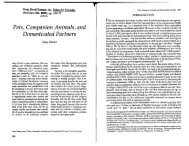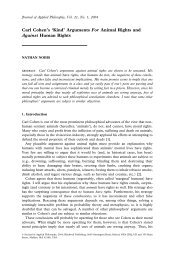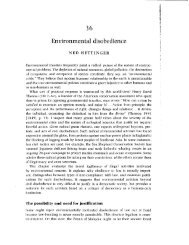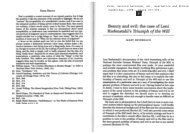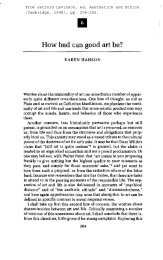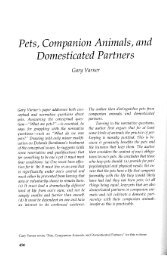Anthropocentrism vs. Nonanthropocentrism: Why Should We Care?
Anthropocentrism vs. Nonanthropocentrism: Why Should We Care?
Anthropocentrism vs. Nonanthropocentrism: Why Should We Care?
Create successful ePaper yourself
Turn your PDF publications into a flip-book with our unique Google optimized e-Paper software.
ANTHROPOCENTRISM VS. NONANTHROPOCENTRISM<br />
175<br />
right way. I donʼt just want to know whether I should act in a more sympathetic<br />
manner toward my friends; I want know whether I should be more sympathetic<br />
to them – and being sympathetic necessarily involves feeling sympathy. I donʼt<br />
just want to know whether I should act more proudly; I want to know whether<br />
I should be more proud – and being proud necessarily involves feeling pride.<br />
Our moral lives are lived from the inside, in the first person, and from this<br />
point of view we have an interest in more than just satisfying the claims that<br />
others legitimately make on us. <strong>We</strong> care not only about generating properly the<br />
ʻoutputsʼ (actions, behaviours, choices, etc.), but also about the inner life of the<br />
being who produces those outputs. <strong>We</strong> evaluate the moral goodness of our lives<br />
as lived from within. In the cases of both ourselves and others, then, norms for<br />
feeling are expressions of the independent moral interest that we take in the<br />
inner lives of human beings. 21<br />
Finally, questions about how we should feel about the world canʼt be reduced<br />
to questions about which ways of feeling best serve our interests, for questions<br />
about how to feel are also in part questions about which feelings are called for<br />
by their objects – which feelings are deserved, apt, or fitting. Discovering that it<br />
would be in my interest to feel admiration for my boss doesnʼt fully answer the<br />
question of whether I should admire her. 22 There is also the question of whether<br />
she deserves admiration – of whether she really is admirable.<br />
So we do have an ethical interest in answering questions about how to feel,<br />
and this doesnʼt just amount to wanting to know which actions to perform<br />
or which feelings it would be in our interest to have. But what effect would<br />
anthropocentrism have on the way that we answer such questions? To answer<br />
this, letʼs consider how the central claim of anthropocentrism might conflict<br />
with certain kinds of feelings.<br />
IV. FEELINGS AND THE SOURCES OF VALUE<br />
Some attitudes that we can take toward a thing are incompatible with thinking<br />
that its value is entirely dependent on its satisfaction of our interests. Take the<br />
case of love, for example. Suppose that I claim to love my friend, but I also<br />
claim that she only has value to the extent that she serves my interests. If she<br />
didnʼt serve my interests, I claim, she would have absolutely no value whatsoever.<br />
If I said this, you might well wonder whether I was being serious when I<br />
claimed to I love her. Would it help my case if I told you a long and complex<br />
story about all of the ways in which she serves my interests? I could explain<br />
that she brings joy to my life, that she inspires me to be a better person, that<br />
she allows me to see the world in new ways, and that her friendship is essential<br />
to having my life go the way I had always hoped it would go. Still, the story I<br />
am telling is an entirely self-centred one, and that is precisely the problem. The<br />
love involved in friendship is an other-centred emotion. 23 To love something in<br />
Environmental Values 16.1







